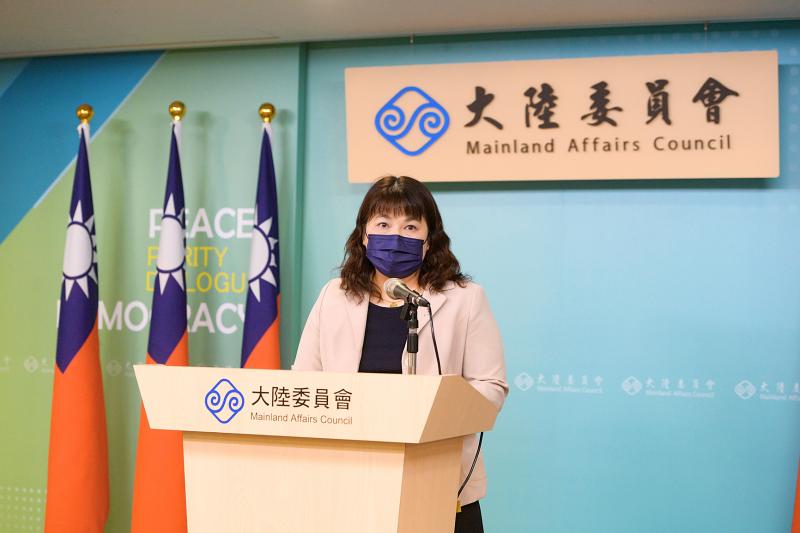Nearly 90 percent of Taiwanese oppose Beijing’s “one China, two systems” and its diplomatic oppression of Taiwan, including its moves against Lithuania, a poll released yesterday by the Mainland Affairs Council (MAC) showed.
The high polling numbers suggest that the majority supports the government’s cross-strait policy, MAC Deputy Minister Lee Li-jane (李麗珍) told an online news briefing.
The poll showed that 83.9 percent of respondents support President Tsai Ing-wen’s (蔡英文) stance that Taiwan’s only option is to build up its strength, solidarity and defensive capabilities.

Photo courtesy of the Mainland Affairs Council
It also showed that 70.4 percent of respondents disagree with Beijing’s attempts to show that the US’ pledge of protection is “shaky” following its withdrawal from Afghanstan, while 88.6 percent support the government collaborating with the US and like-minded countries to ensure peace and stability in the Taiwan Strait.
The survey found that 64.2 percent of respondents back legislative amendments to restrict specialists in technologies critical to the state from visiting China, the council said.
Furthermore, 64 percent support stricter examinations of Chinese citizens attempting to enter Taiwan, it said.
Support for maintaining the cross-strait “status quo” stood at 85.4 percent, and 73 percent felt that Beijing bears an ill will toward the Taiwanese government, while another 57.9 percent thought Beijing was antagonistic to Taiwanese in general, the survey showed.
More than 85 percent said that only the Taiwanese public can determine Taiwan’s future and the development of cross-strait relations, it showed.
The survey, commissioned by the council, was conducted by National Chengchi University’s Election Study Center from Thursday last week to Monday. It collected 1,073 valid results from the telephone poll targeting Taiwanese aged 20 and older.
In related news, Lee said that the council is aware that some people have proposed signing a memorandum of understanding on promoting cross-strait peace, apparently referring to a proposal made by Sun Yat-sen School president Chang Ya-chung (張亞中), who is running for Chinese Nationalist Party (KMT) chairperson.
Without the approval of the council or other authorities, any agreement concerning political issues with the Chinese government would be illegal, Lee said, citing the Act Governing Relations Between the People of the Taiwan Area and the Mainland Area (臺灣地區與大陸地區人民關係條例).
Any political negotiations, without a public mandate, would run counter to the majority opinion, Lee added.

The manufacture of the remaining 28 M1A2T Abrams tanks Taiwan purchased from the US has recently been completed, and they are expected to be delivered within the next one to two months, a source said yesterday. The Ministry of National Defense is arranging cargo ships to transport the tanks to Taiwan as soon as possible, said the source, who is familiar with the matter. The estimated arrival time ranges from late this month to early next month, the source said. The 28 Abrams tanks make up the third and final batch of a total of 108 tanks, valued at about NT$40.5 billion

Two Taiwanese prosecutors were questioned by Chinese security personnel at their hotel during a trip to China’s Henan Province this month, the Mainland Affairs Council (MAC) said yesterday. The officers had personal information on the prosecutors, including “when they were assigned to their posts, their work locations and job titles,” MAC Deputy Minister and spokesman Liang Wen-chieh (梁文傑) said. On top of asking about their agencies and positions, the officers also questioned the prosecutors about the Cross-Strait Joint Crime-Fighting and Judicial Mutual Assistance Agreement, a pact that serves as the framework for Taiwan-China cooperation on combating crime and providing judicial assistance, Liang

A group from the Taiwanese Designers in Australia association yesterday represented Taiwan at the Midsumma Pride March in Melbourne. The march, held in the St. Kilda suburb, is the city’s largest LGBTQIA+ parade and the flagship event of the annual Midsumma Festival. It attracted more than 45,000 spectators who supported the 400 groups and 10,000 marchers that participated this year, the association said. Taiwanese Designers said they organized a team to march for Taiwan this year, joining politicians, government agencies, professionals and community organizations in showing support for LGBTQIA+ people and diverse communities. As the first country in Asia to legalize same-sex

MOTIVES QUESTIONED The PLA considers Xi’s policies toward Taiwan to be driven by personal considerations rather than military assessment, the Epoch Times reports Chinese President Xi Jinping’s (習近平) latest purge of the Chinese People’s Liberation Army (PLA) leadership might have been prompted by the military’s opposition to plans of invading Taiwan, the Epoch Times said. The Chinese military opposes waging war against Taiwan by a large consensus, putting it at odds with Xi’s vision, the Falun Gong-affiliated daily said in a report on Thursday, citing anonymous sources with insight into the PLA’s inner workings. The opposition is not the opinion of a few generals, but a widely shared view among the PLA cadre, the Epoch Times cited them as saying. “Chinese forces know full well that